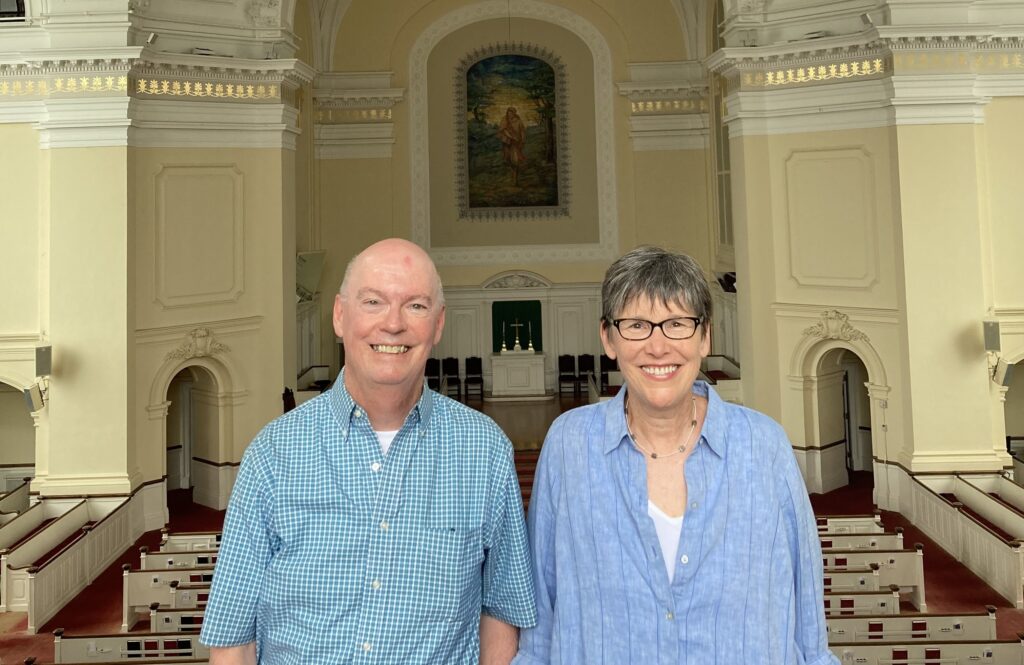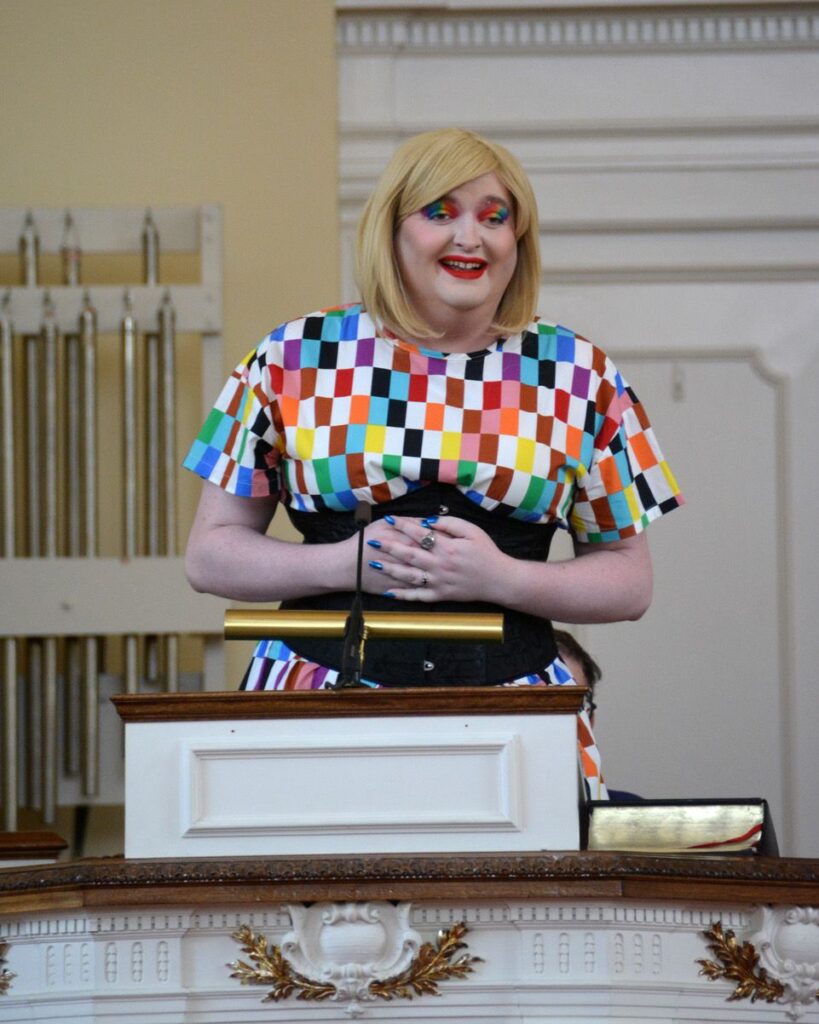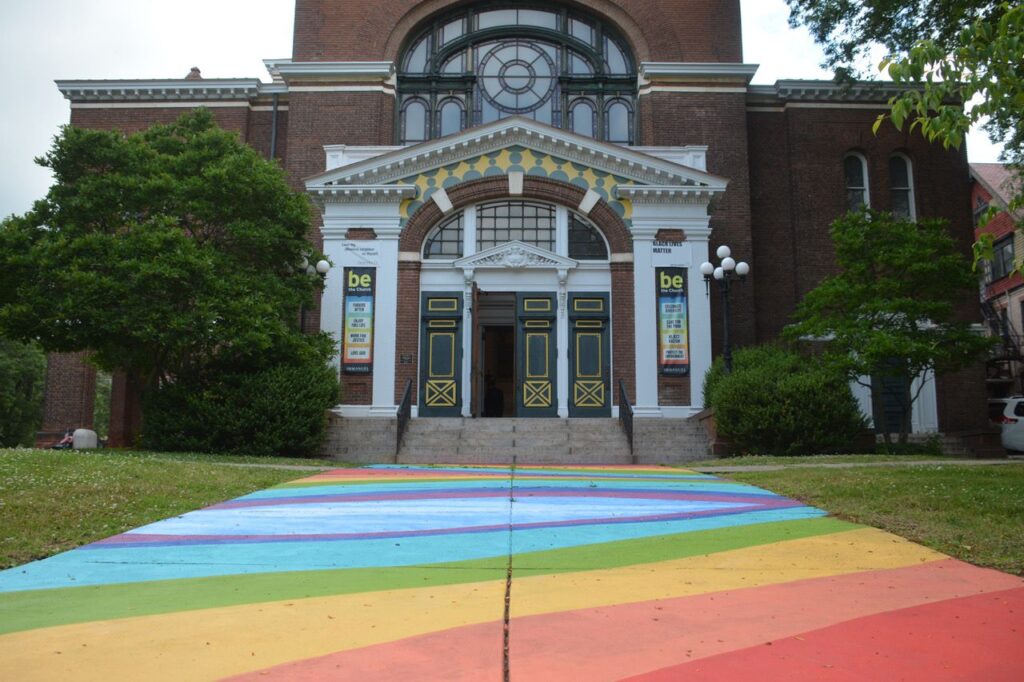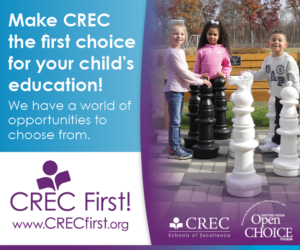By John Scully & Anne Stanback

John’s Story:
When Matthew Shepard, the gay college student, was murdered in Laramie Wyoming in 1998, there was outrage in cities all over this country. Hartford was no different. More than 800 people with candles silently marched down Farmington Avenue to Immanuel Congregational Church, where a memorial service was held. I remember that time in our history well. And two years later, when I felt something missing in my life, I remembered the church that warmly opened its doors to a hurting and angry community.
My husband, David Osella, and I are both from families of six children and were raised Catholic. We went to church with our families each Sunday and received the sacraments up to confirmation. We met in 1986 at Dignity Hartford, a now defunct chapter of Dignity USA, which was a progressive and inclusive Catholic community not sanctioned by the official Catholic church. Dignity held a Catholic Mass on Sunday evenings for the gay and lesbian community. When they disbanded, knowing how strongly the Catholic church lobbied against the Gay Rights Bill in the late 80’s, we figured all churches felt that way. And so, we did nothing. But we’d been “churched.” It was part of who we were, and I missed being moved and inspired by a good sermon, church music, and that sense of community. We attended our first service at Immanuel in October of 2000.
Anne’s Story:
Like most everyone else in my North Carolina hometown, I grew up attending church every week. Once I went off to college, I stopped going but got engaged with the campus ministry’s social justice work. That work was meaningful enough to me that two years later I entered Yale Divinity School. It was there I realized I was a lesbian, and there I learned more fully how religion—and Christianity in particular—bore a huge responsibility for society’s distain for LGBTQ+ people. I loved my time at YDS, and it set me on my career path working for justice organizations. But after I graduated, I didn’t step back into a church for another 16 years. As someone whose core identity in was “lesbian feminist,” church was not just irrelevant; it was a place where I felt invisible at best and hostility at worst.
Then in the fall of 2001, I was invited to speak about marriage equality at Immanuel Congregational Church in honor of the church’s first anniversary of becoming Open & Affirming (O&A). I went back the following week as a visitor, and 21 years later I continue to find it a place that fully affirms me for who I am; that engages me in work around racism, environmental justice and other issues; and that challenges me to be a better person.

Immanuel’s Story:
Although Immanuel historically welcomed all people, the congregation began a two-year study process in 1998, and in 2000 voted unanimously to become Open & Affirming. In 2012, Immanuel furthered our study and added gender identity and expression to our O&A statement. In the United Church of Christ (UCC)— Immanuel’s denomination—the designation of Open & Affirming is a public covenant of welcome of LGBTQ+ people into the full life and ministry of a church. Today, Immanuel has a very active group of people who identify as LGBTQ+, including several of us in church leadership. The majority of the congregation, however, are allies, many of whom found their way to us because of our early O&A declaration.
Immanuel has served as a home for PFLAG Hartford for more than 20 years. In 2004, when the Knights of Columbus and other anti-LGBTQ+ churches held a rally against marriage equality, Immanuel opened its doors to more than 900 people who attended a Speak Out organized by Love Makes a Family. For decades, we were one of the few faith-based groups that had a presence at Hartford Pride, the Transgender Health and Law Conference, and the True Colors Youth Conference. For those of us who sat at the Immanuel table, we will never forget what it felt like when queer youth or trans adults shared their shock—and also their joy—at seeing a church show up at an LGBTQ+ event.
Happily, there are many more congregations today—of all faiths—that welcome and affirm the queer community. If you are searching for a faith community, we invite you to join us for Sunday worship. And if we aren’t the right fit for you, we will help you find another congregation that affirms LGBTQ+ people.
Ann Stanback is Moderator of the Church Council. John Scully is Church Council Clerk for Immanuel Congregational Church. To find out more information, visit Immanuel at https://www.iccucc.org/








More Stories
Make It Here, Just As You Are
Queer Joy and Queer Resilience
The Final Word: Embracing Differences